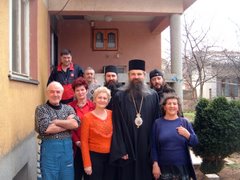Imposed Kosovo Independence Sets Dangerous Precedence
End Balkanization Now! By Aleksandar Mitic
An old saying in Montenegro used to say “Montenegro and Serbia – one family". Today, pro-independence graffiti in Montenegro read “Montenegro and the Basque Country – one family”.
Indeed, if the preliminary results of the Montenegrin referendum on independence are confirmed, the process of the balkanization of the Balkans will have scored one more point.
Some say it also paved a chance for many independence-hopefuls around Europe, be it in Catalonia, the Basque Country or Scotland, which have sent their observer missions to Podgorica to monitor the mechanics of intra-state divorce.
It might be contrary to the logic of European integration and the equation mark between the European Union and “borderless Europe”, but it is real and it is happening in 2006, just a few weeks before the June summit on “the future of Europe”.
As far as enlargement is concerned, EU leaders should answer the question: “Does a European future imply further balkanization of the Balkans?” or “Do the Balkans have to choose a nationalistic past in order to pave their way to their European future?”.
If the answer is yes, EU finance ministers should start planning a budget for more crisis management and Balkan nations should start digging out marching songs cds back from the basement.
If not, the “balkanization of the Balkans” must end. Now!
It must end now, because Montenegrin independence at least had a legal basis. Under the findings of the 1991-92 Badinter Commission on the dissolution of the former Yugoslavia, all six Yugoslav republics – and only republics not provinces -- had the legal right to become independent.
After Slovenia, Croatia, Bosnia-Herzegovina and Macedonia, Montenegro is the last former Yugoslav republic to seize the opportunity.
It means that Kosovo, a province of Serbia, does not have the right to secession. Indeed, an independence of Kosovo – against the will of Serbia – can only be illegal, one-sided and imposed.
As such, an independent Kosovo would be the real, universal opener of the Pandora box of separatism.
According to the UNDP, there are some 5,000 different ethnic groups living in some 200 countries in the world. According to the figures of the study “Minorities at risk”, some 509 ethnic groups in the world consider themselves as politically discriminated and want autonomies or states.
All separatist or independence-seeking movements in the world already have their eyes set on the resolution of the Kosovo talks, especially since most of them have suffered much more tragic conflicts and have waited for the solution to their problems much longer than has the southern Serbian province, populated by an Albanian majority.
Indeed, a Kosovo precedent would have world ramifications.
It could impact on the tense relations between two nuclear powers – India and Pakistan – disputing Kashmir, a region very much like Kosovo in terms of ethnic proportions, violence or religious symbolism.
It could have an impact on the world’s largest country – Russia – with Transdniestria in Moldova, Abkhazia and South Ossetia in Georgia seeking to integrate it and Chechnya seeking to separate.
The world’s most populous country – China – could face separatism in Xinjiang, not forgetting Taiwan and Tibet.
Eternal pragmatists should think about the impact of imposed independence on some of the world’s most important pipelines – winding their way through disputed territories around Georgia, Nagorno-Karabakh or a Kurdistan.
Back to the Balkans, people still do not know whether they will be part of the next wave of EU enlargement due to its “absorption capacity”, but they surely are themselves still digesting the last wave of balkanization from the 1990s.
In the news today, the High representative in Bosnia-Herzegovina Christian Schwarz-Schilling expressed his worry about the slow progress of reintegration of the southern Bosnian town of Mostar, divided between Croats and Muslims since a conflict which ended 12 years ago.
Near Prizren, in Kosovo, an Albanian mob clashed with UN police after attacking and injuring Serb lawyers investigating a war crimes case for the Hague tribunal. A local Albanian leader later explained it was a mistake: they thought they were attacking Serb refugees trying to visit their homes seven years after being brutally expelled.
So, what kinds of signals would the pursuit of balkanization send to the Muslims in the Sandzak area, the Albanians in southern Serbia or in western FYROM, the Hungarians in northern Vojvodina, the Serbs in eastern Slavonia, eastern Montenegro or eastern Bosnia?
Indeed, if “yes” to an independent Kosovo, why not a “yes” to an independent Republika Srpska for example – which also has a 90-percent majority seeking to break away?
I can almost feel some eyebrows raising.
But can there be any more “taboos” if there are no more principles?
TEXT TOOLS
Printer Friendly Version
Send comments to the author
ABOUT THE AUTHOR
Aleksandar Mitic is a Brussels-based Correspondent of the Tanjug news agency, a Lecturer at the University of Belgrade and Analyst of the Institute 4S.Aleksandar Mitic Archive -->
SERBIANNA COLUMNISTS
Carl Savich
Sam Vaknin, Ph.D
Christopher Deliso
M. Bozinovich
Marko Lopusina
TV Weber
Boba Borojevic
Sonja Jekic, Ph.D.
Miroljub Jevtic, Ph.D.
Johnathan Widell
Srdja Trifkovic, Ph.D.
Stella Jatras
Tatijana Lazic
Aleksandar Mitic
Vojin Joksimovich Ph.D
Russell Gordon
Visit the archives of the above columnists on serbianna.com or become a columnist yourself. Find out how.
TERMS OF USE
Opinions expressed by the author of this article do not necessarily represent the views of serbianna.com. Any comments you may have about the article send them to the author and not to serbianna.com
Views & Analysis
Kosovo Within a Democratic European Serbia By Boba Borojevic
Kosovo: The Power of Compromise By Alexander Mitic
Dividing the Pannonian Sea By Russell Gordon
Les Drysdale on His Tesla Monument By Boba Borojevic
IMF: Decrypting the diatribe By M. Bozinovich
Moscow Calling: Why Milosevic was never trated in Russia? By Jonathan Widell, Dr Patrick Barriot and Jacques Vergès
Religion & Politics in NATOs Pro-Albanian Policy By Miroljub Jevtic, Ph.D.
Acts of Prophet's Disciples By M. Bozinovich
Book Review: Mediterranean Odyssey By Carl Savich
The ICTY Report On Milosevic's Death By Jonathan Widell & Nico Steijnen
End Balkanization Now! By Alexander Mitic
Montenegro: Euro-Fantasy By Boba Borojevic
Yugoslavia and the Cold War Part 1 By Carl Savich
Copyright Serbianna.com Since 1999
If you cannot click to the additional commentaries above click on this http://www.serbianna.com/columns/mitic/008.shtml

















